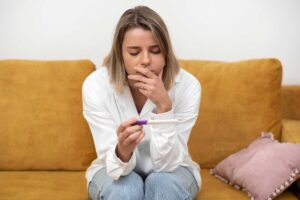Endometriosis and Fertility: Can You Still Get Pregnant?

Endometriosis is a condition where tissue similar to the uterine lining grows outside the uterus, often leading to pain and fertility complications.
But does it mean you can’t conceive? The short answer is yes, you can conceive, but the journey may require extra care, medical support, and patience.
In this blog, we’ll break down the relationship between endometriosis and fertility, common challenges, and potential solutions.
How Does Endometriosis Impact Fertility?
Endometriosis is a main cause of infertility, affecting the reproductive system in multiple ways.
This condition develops when tissue similar to the uterine lining (endometrium) grows outside the uterus, commonly affecting the ovaries, fallopian tubes, and nearby pelvic organs.
The presence of this misplaced tissue can trigger inflammation, scarring, and hormonal imbalances, all of which can interfere with conception.
- Blocked fallopian tubes – Endometrial tissue can block or damage fallopian tubes, preventing egg and sperm from meeting.
- Ovarian damage and poor egg quality – Endometriomas (cysts) may reduce ovarian function, and inflammation can lower egg quality.
- Implantation issues – Hormonal imbalances and inflammation can make the uterus less receptive to a fertilized embryo.
- Immune system dysfunction – An overactive immune response may attack sperm, eggs, or embryos, reducing conception chances.
- Increased inflammation – Chronic inflammation creates a toxic environment, affecting egg and sperm health.
Can you Still Get Pregnant with Endometriosis?
Yes! Many women with endometriosis conceive naturally, but others may need medical assistance.
The condition’s severity plays a significant role in fertility outcome:
- Mild to moderate endometriosis: Many women with minimal or mild endometriosis can conceive without treatment or with lifestyle modifications.
- Moderate to severe endometriosis: If the fallopian tubes or ovaries are significantly affected, fertility treatments such as laparoscopy with treatment of endometriosis, Intrauterine Insemination (IUI), or In Vitro Fertilization (IVF) may be necessary to achieve pregnancy.
Ways to Get Pregnant with Endometriosis
If you’re trying to conceive with endometriosis, here are some steps that may help:
Medical treatments and fertility interventions
- Freezing your eggs: Preserving eggs at an early stage can improve future pregnancy chances, particularly for women with advanced endometriosis or those delaying childbirth.
- Intrauterine Insemination (IUI): This procedure places sperm directly into the uterus, bypassing potential obstacles in the fallopian tubes and improving fertilization rates.
- Fertility medications: Ovulation-stimulating drugs such as Clomid or letrozole can help improve egg release, making conception more likely in some patients
- In Vitro Fertilization (IVF): A highly effective option where eggs are fertilized in a laboratory and then transferred to the uterus, offering a greater chance of pregnancy, particularly for women with severe endometriosis or blocked tubes.
Lifestyle changes
- Follow an anti-inflammatory diet: Consuming foods rich in omega-3 fatty acids, antioxidants, and essential nutrients—such as leafy greens, berries, nuts, and fatty fish—can support reproductive health.
- Maintain a healthy weight: Being overweight or underweight can disrupt hormonal balance and ovulation, making weight management essential for improving fertility.
- Engage in moderate exercise: Regular physical activity enhances circulation, reduces stress, and helps regulate hormones. Low-impact exercises like yoga, walking, and swimming are ideal.
- Reduce stress: Persistent stress can negatively impact fertility by altering hormone levels. Practicing relaxation techniques such as meditation, deep breathing, and acupuncture may help improve reproductive health.
- Limit alcohol and caffeine: Excessive intake of alcohol and caffeine has been associated with reduced fertility. Moderation is key to optimizing your chances of conception.
Endometriosis treatment in Dubai
- Non-steroidal anti-inflammatory drugs (NSAIDs): Medications like ibuprofen help relieve pain and inflammation.
- Laparoscopic surgery: A minimally invasive treatment to remove endometrial implants, cysts, and scar tissue.
- Hysterectomy (Last resort): In severe cases, removing the uterus and ovaries may be considered if other treatments fail and pregnancy is no longer a goal.
Consult a fertility specialist
If you’ve been attempting to conceive for over 6-12 months without success, consulting a fertility specialist in Dubai can help determine the best course of action based on your condition and medical history.
Pregnancy and Endometriosis
Once pregnant, some women experience relief from endometriosis symptoms due to hormonal changes that suppress the condition.
However, in some cases, endometriosis-related complications like an increased risk of miscarriage or preterm labour may arise, requiring close monitoring by an endometriosis specialist Dubai.
Consult Dr Aparna Gumma for Endometriosis and Pregnancy Care
Specializing in high-risk pregnancies and advanced laparoscopic techniques, Dr Aparna Devi Gumma is a highly trusted name in women’s health. As a leading female gynaecologist in Dubai, she brings 29 + years of expertise as an Ob-Gyn and Advanced Gynecologic Laparoscopic Surgeon.
Whether you’re seeking effective endometriosis treatment in Dubai or struggling with getting pregnant with endometriosis, Dr Aparna Gumma provides personalized care, expert diagnosis, and advanced treatment solutions to improve your fertility and overall well-being.
About Dr Aparna
Dr Aparna Devi Gumma, female gynaecologist in Dubai, is one of the most trusted partners in women’s health with over 28 years of expertise as an Ob-Gyn and Advanced Gynecologic Laparoscopic Surgeon.
Related Blogs

Egg Freezing & Fertility Preservation | Process, Cost, Ideal Age & Success Rate
Egg Freezing & Fertility Preservation | Process, Cost, Ideal Age & Success Rate Guide to Future Parenthood – Preserve your dreams of motherhood! Dreaming of motherhood, but waiting to establish your career, undergoing any medical procedures that affect fertility, or yet to accomplish your life goals? Egg freezing or egg

VBAC Vaginal Birth After C-Section Dubai: Options & Expert Guide
VBAC Vaginal Birth After C-Section Dubai: Options & Expert Guide Have you had a C-section before and are now wondering if a natural birth could be possible for your next delivery? For many women, the idea of giving birth vaginally after a previous caesarean brings a sense of empowerment and

Can I get pregnant if my periods are irregular?
Can I get pregnant if my periods are irregular? Guide It is a common question for many women trying to conceive: Can I get pregnant if my periods are irregular? The short answer is yes, it is absolutely possible. However, it can present unique challenges. Dr Aparna Gumma understands the

How do you know you are pregnant? Early signs, testing time & accuracy explained
How do you know you are pregnant? Early signs, testing time & accuracy explained Wondering how to know if you are pregnant can be both exciting and nerve-wracking. Maybe you’ve noticed changes in your body, maybe your period is late, or maybe you just have a feeling something is different.

